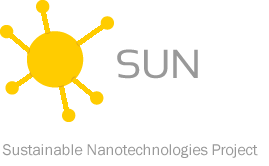Press Release
The EU FP7 SUN Sustainable Nanotechnologies (SUN) Project has successfully hosted a week of high ranking, international nanotechnology events in Venice in the period 1 – 3 March 2017.
The project’s final events served as an effective platform to disseminate the main output from 3 and half years of research focused on developing tools aimed at estimating and managing occupational, consumer, and environmental risks from nanomaterials in real industrial products along their lifecycles. The events were attended by a large international audience encompassing researchers from the European Nanosafety community and the International Society for Risk Analysis, regulators and industry representatives.
The SRA Policy Forum: Risk Governance for Key Enabling Technologies (KETs) brought together more than 140 delegates from around the globe and was a successful avenue for SUN’s efforts to transfer the knowledge generated within the project to the wider topic of KETs. This contributed not only to a better understanding of the major challenges emerging from uncertain technology risks, but also to developing ideas on how to overcome those across different industrial sectors. In this way, the conference provided important input to the future international multidisciplinary research agenda for further development of the field of risk innovation governance for KETs.
Jointly organized and sponsored by the EU-FP7 SUN project, the Horizon 2020 caLIBRAte project, the Society for Risk Analysis (SRA) and the NanoLab project, the Forum showcased current efforts put towards addressing the risks of emerging technologies featuring a key note speech by Lieutenant General Thomas P. Bostick, PhD, describing the challenges of risk governance in government and industry, 5 interactive panels, 15 parallel sessions and 2 poster sessions.
“The SRA Policy Forum was a great opportunity to demonstrate that the results from the excellent research on developing methods and tools for assessing and managing the risks from nanotechnologies performed by projects like SUN and caLIBRAte are applicable also to other emerging technologies that are currently facing similar scientific and regulatory challenges. The conference has contributed to developing ideas on how to overcome some of these challenges by means of robust risk governance approaches. Such approaches can not only manage risk, but can also help in steering innovation so that these technologies successfully cross the “Valley of Death” to have a more sustainable and competitive future on the global market”, says Dr. Danail Hristozov, Principal Investigator of the SUN project.
2 satellite events were held within the SRA Risk Forum, namely the EU NanoSafety Cluster Task Force Meeting (coordinated by caLIBRAte) for establishment of an EC Nanotechnologies Risk Governance Body, and the SUN-CaLIBRAte Stakeholders workshop: From nano risk management to innovation governance: Developing state of the art, reliable and trustable, governance models and tools for nanomaterials.
The week started with the EU NanoSafety Cluster Task Force Meeting, which took place on 1st March in the Ca’Foscari University of Venice. The workshop set the dialogue for the upcoming conference by explaining the need for a coordinated EU action on nano-risk governance. Its objectives were introduced by Dr. Georgios Katalagarianakis from the European Commission who stressed that “governance means, first, defining a goal or goals, then implementing policies towards the goal and taking action on information, communication, planning and feedback, and monitoring of the progress” pointing out the key challenge on the way to the governance of engineered nanomaterials is in engaging the civil society. The meeting was chaired by the Task Force and caLIBRAte project coordinator Keld Alstrup Jensen from the National Research Centre for the Working Environment in Denmark. Minutes and presentations given at the meeting are available at the NanoSafety Cluster Website.
The week concluded with the SUN-caLIBRAte Stakeholders workshop: From nano risk management to innovation governance: Developing state of the art, reliable and trustable, governance models and tools for nanomaterials held on 2-3 March 2017. The workshop was a successful synergistic effort to bridge activities of the large EU-funded research projects SUN and caLIBRAte by fostering progression of risk assessment and management towards risk governance, through integration of traditional and new models routed in physical science and approaches from social science and related disciplines.
The workshop served as an effective platform to discuss stakeholders’ risk perception and needs on managing risk, to present state of the art achievements on nano-risk governance, as well as to explore the SUN software-based Decision Support System (SUNDS) as one of the elements of the future caLIBRAte System of Systems risk governance framework for nanotechnologies.
For more information about SUNDS visit: http://sunds.dais.unive.it.
The Sustainable Nanotechnologies Project’s main objectives were to:
- Establish new methods and tools for prediction of longer-term nanomaterials exposure, effects and risks for humans and ecosystems (services)
- Propose implementable practices for risk prevention and control applicable to industrial, consumer and environmental settings
- Create guidance for safer production, handling and end-of-life treatment of nano-enabled products
- Develop a risk management Decision Support System for practical use by industries and regulators.
The SUN project results are made available for download here:
